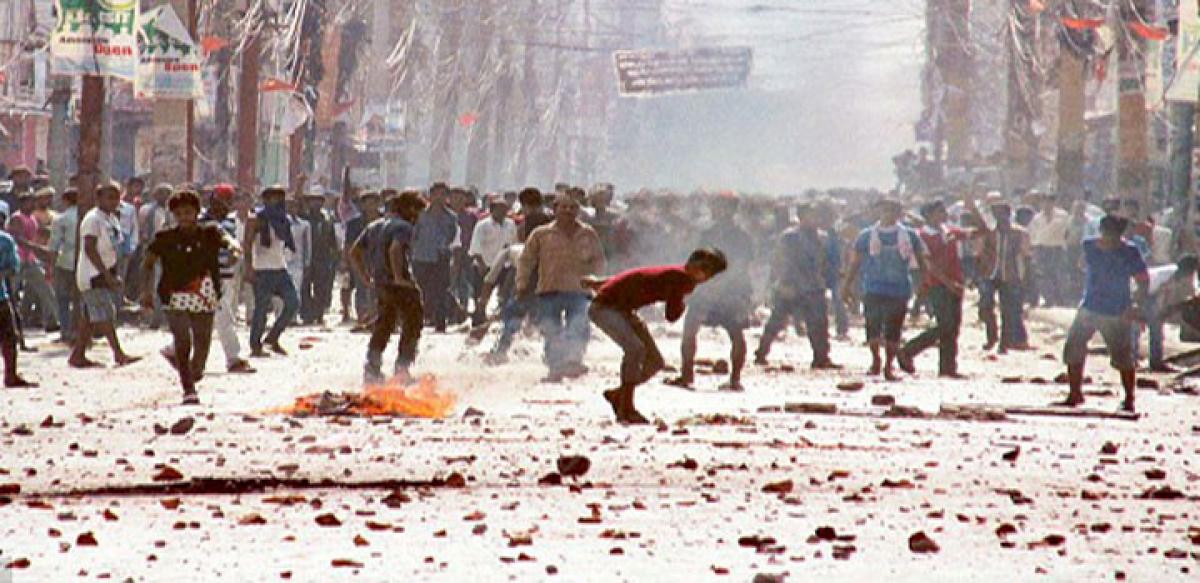Live
- Cops intensify probe
- Uphold prestige of Assembly: Pawan
- Children are nation's future, says Revanth
- SC junks plea to ban WhatsApp
- RRR elected Assembly Dy Speaker unopposed
- Cong wants separate Constitution in J&K
- Modi never read Constitution, hence it is blank for him: Rahul
- AP: Global destination
- Tulsi Gabbard on National Intel
- Tribal women from Lagacharla seek KTR’s support
Just In

Finally, there appears light at the end of the tunnel for the much- maligned and oppressed Indian-origin people – Madhesis – in the Terai region of Nepal. The four-month fierce stir which saw blockade of essential supplies to Nepal is set for an amicable resolution. The K P Sharma Oli Government on December 20 announced measures to appease Madhesis through passage of the pending Constitutional Amendment Bill.
Nepal govt assures to meet Madhesi demands; India welcomes, seeks resumption of trade talks
.jpg)
The matters came to such a pass that Madhesis, agitating against injustice in the Constitution for three months, attacked the motorcade of Nepal President Bidhya Devi Bhandari at Janakpur, barely 120 km from Kathmandu, on December 16. Taking in its stride Nepal’s overtures to China and complaints to other nations including the UK, India kept constantly engaging the Nepali government till it saw reason
Finally, there appears light at the end of the tunnel for the much- maligned and oppressed Indian-origin people – Madhesis – in the Terai region of Nepal. The four-month fierce stir which saw blockade of essential supplies to Nepal is set for an amicable resolution. The K P Sharma Oli Government on December 20 announced measures to appease Madhesis through passage of the pending Constitutional Amendment Bill.
This is a good augury for a country wracked by a devastating earthquake and months of wrangling over the new Constitution-making process and nearly four months of fierce Madhesi agitation that pushed the country to the brink of major crisis. The timing of the government announcement could not have been better for the country’s apex central bank, the Nepal Rastra Bank, has warned the government of an impending stagflation scenario – inflation has already jumped to double-digits. The Bank warned that prolonged strikes in the Terai region, obstructions on trade routes and hoarding of essential items were key factors contributing to the surge in inflation. Stagflation, according Wikipedia, is a situation in which the inflation rate is high, the economic growth rate slows, and unemployment remains steadily high.
Jittery as it has been over the fate of its origin people and growing anti-India stance in its immediate eastern neighbour, India readily welcomed the move. It was faced with an ugly situation of being projected as a big brother breathing down the necks of its small neighbours. The Madhesi situation looked all set to snowball into a Sri Lankan Tamil sort of issue for India.
It may be recalled that Nepal adopted a new Constitution on September 20, 2015, after over two years of wrangling. The Constitution – whose draft had not been approved of by any political party of Madhesis – dealt a raw deal to the Madhesis and ethnic people of Tharus in the Terai plains abutting India’s border. It relegated them to almost second-class citizens in their own country wherein they comprise about 70 per cent of the population. They were denied proportional representation in government and constitutional bodies. Curbs were placed on naturalising citizenship of their spouses from abroad.
Out of 22 districts in Terai region, only 8 were formed into a State and the rest were merged with hilly region States. They were allotted just 65 seats in 165-strong Parliament which is represented by 7 States comprising 75 districts.
Already denied justice for long under the kings of Nepal, Madhesis could brook justice no longer. With all their hopes dashed, they launched a fierce agitation and choked the supplies from India. The Oli government suspected India’s hand and took recourse to use of force and diplomatic offensive against India. It made matters worse for Madhesis and Nepalis as a whole with each passing day.
The matters came to such a pass that Madhesis on December 16 attacked the motorcade of Nepal President Bidhya Devi Bhandari at Janakpur, barely 120 km from Kathmandu. Taking in its stride Nepal’s overtures to China and complaints to other nations including the UK, India had kept constantly engaging the Nepali government. Its patience paid off finally, with the Oli regime seeing reason and agreeing to take up at the earliest the constitutional bill moved by the previous Sushil Koirala government.
The government has assured Madhesis proportionate representation and redrawing of electoral constituencies in the Terai region. This is a major climb-down by a government which had even refused to acknowledge the home-grown stir by the Madhesis. However, Nepal would do well to heed the advice of its long-time and trusted ally, India, to demonstrate necessary maturity in talks with the agitators.
The United Democratic Madhesi Front’s demands mainly include at least one parliament constituency in each district, equal representation in all constitutional posts and organs of the State through certain reservation, lifting of all restrictions on naturalized citizenship of foreigners marrying Madhesis, restoration of alienated Madhesi districts back to them etc.
The ethnic roller coaster in Nepal has been a source of great anxiety for the Modi government, what with critics in and out of the country equally slamming its patronising stance towards the Madhesis. India now heaves a major sigh of relief over the breakthrough as bilateral ties and commerce have been strained for three years due to Maoist influence, deadly earthquake and simmering anti-India feelings during the Constitution-making. It has now called for earliest resumption of commerce secretary-level talks held up for the last two years. A major turbulent phase in Indo-Nepal ties is drawing to a close, at last.
By:K Balaram Reddy

© 2024 Hyderabad Media House Limited/The Hans India. All rights reserved. Powered by hocalwire.com







